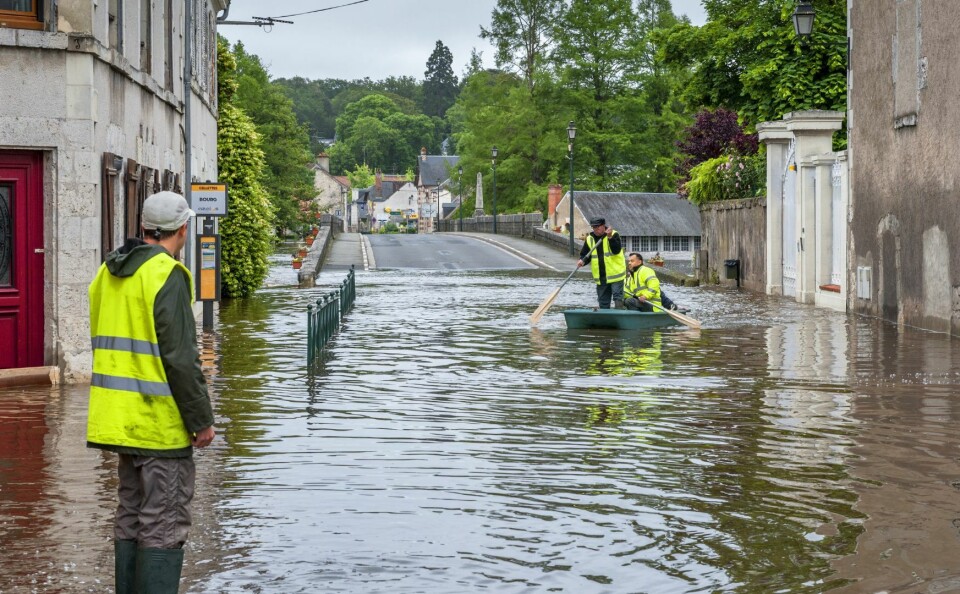-
Large increase in Americans buying properties on the Cote d’Azur
President Trump is cited as a major factor, but is not the only reason for the area’s popularity
-
Dordogne residents face aftermath of flood damage as more rain forecast
Residents are advised to stay alert
-
Record river levels, more evacuations: Latest on flooding in south-west France
Alerts are in place across five departments and residents in some areas are told to stay home
House hunters in France ignore flood risks for better location
Recently flooded properties are still selling say estate agents - how to check if an address is at risk

Property hunters are being encouraged to research natural disaster risk carefully before committing to a purchase following weeks of flooding in northern France this winter.
One housing development in Pas-de-Calais was featured on television news reports because, adjacent to the flooded homes, building work was under way on brand new properties.
Read more: France’s ‘catastrophe naturelle’ insurance system: how to claim
Website to search flood risk
There are now 16,000 communes in France with at least one zone inondable in them, according to latest figures from January 2023.
They can be identified using the Atlas des Zones Inondables (AZI ) on the Georisques website.
You can also search local flood risk by inputting your property’s address in the search facility on the home page.
New builds may still be allowed in flood risk zones
At a legal level, inclusion in the AZI does not necessarily prevent the building of new homes, or apply flood-related regulations.
These only come in if the area is covered by a plan de prévention des risques d’inondation (PPRI).
This must define precisely which zones are covered – there might be several in a single commune – regulate or ban new building, show buildings and use of land in the zone, and give flood plans, including how to reduce risk to existing buildings.
PPRIs are colour-coded: red zones denote high risk and usually ban all new buildings, while blue zones are medium to low risk, where some new development might be allowed as long as suitable precautions are taken, such as building on stilts or hummocks.
Each department must also have a public document outlining major flood risks, which can be found through the Georisques website.
Read more: MAP: Warning of insurance issues as flood-risk zones in France expand
Buyers ignore risk to live near the sea
Despite this information being readily available, estate agents report that in some coastal communes that have recently experienced flooding, affected houses are still selling for very high prices.
Buyers, they say, are prepared to ignore the risk for a chance to live within a few minutes’ walk of the beach.
In Montreuil-sur-Mer (Pas-de-Calais), a 130m² house in a development built 30 years ago, which has previously been flooded by 20cm of water, sold for €300,000 in September.
Similar properties account for some 60% of local agencies’ sales in most years.
An agent for Century 21 in Montreuil told The Connexion about the sale: “The property was in a low-lying area and the risk of being flooded was spelt out in all the documents.
“However, the buyers wanted to be near the coast and liked the house, so they bought it.”
Market will bounce back when memories of flooding fade
The agent added that most of the new properties in the department that were flooded this winter are inland, in the low-lying estuary region.
“They are unsellable now – everything has stopped because there is still water, and even the insurance assessors are unable to really do their work.
“It will take a year or more for work to be done to get some of the houses in a state where they might be sold, and then the fact that they have been flooded this winter will be recorded.
“For some time now, we have had to make sure each house we sell has a Georisques document, which covers floods, as well as things like earthquake risk.
“Flood damage and how much insurers paid out to repair it is all documented too.
“I expect it will be a couple of years, when people’s memory of the event starts to fade, before the market will return to what it was.”
Buyers should use common sense
The agent added that, in theory, properties in low-lying areas should have lower prices because of the risk of flooding, but often this was not the case.
“People see a nice location and that is nearly always the main motivation for a buy.
“They do not think that the nice location might be flooded, even when it is written down for them. But after this flood, it will take a couple of years to get back to that state.”
Experts suggest that property hunters who are worried about flood risk should first use common sense: if it is a riverside property and the banks are low, it is likely to be at risk.
Similarly, seaside properties, unless they are on high hills, are more likely to flood than inland ones.
Cliff-top properties, however, often come with a risk of erosion and subsequent collapse into the sea below.
A visit to the local mairie to see the plan local d’urbanisme (PLU) will show up parts of the commune where building has been forbidden because of flood risk – and if the property you want is close to these areas, then you might want to reconsider.
Expert opinion can disagree with local knowledge
However, declaring parts of a commune not suitable for building in a PLU because of flooding is often politically difficult for councils.
Residents realise land they had bought as a nest egg to be sold for development loses most of its value – and can often point to local knowledge saying parts deemed by experts to be at risk have not flooded in living memory.
An example was when Javer-lhac-et-la-Chapelle-Saint-Robert, a commune in the north of Dordogne, started working on a PLU in the early 2000s.
For the first time, this took into account flood risk assessments from hydrologists, who marked large parts of the village, which is beside the Bandiat river, as at risk.
Long-term residents disputed this, arguing that a floodplain upstream from the village had always stopped the river from overflowing.
Related articles
Make sense of local rules governing planning permission around France
How can I reduce the cost of home insurance in France?
Do I need to put guttering on my French home?
























